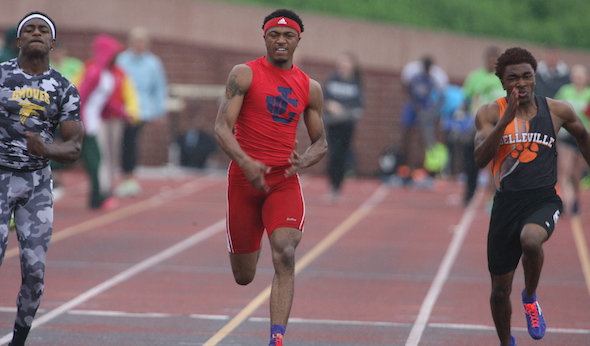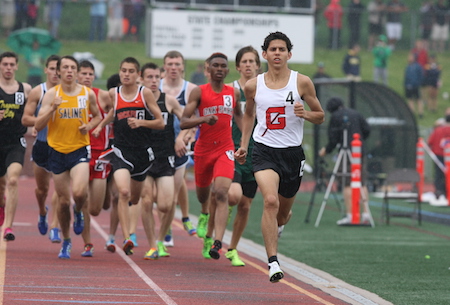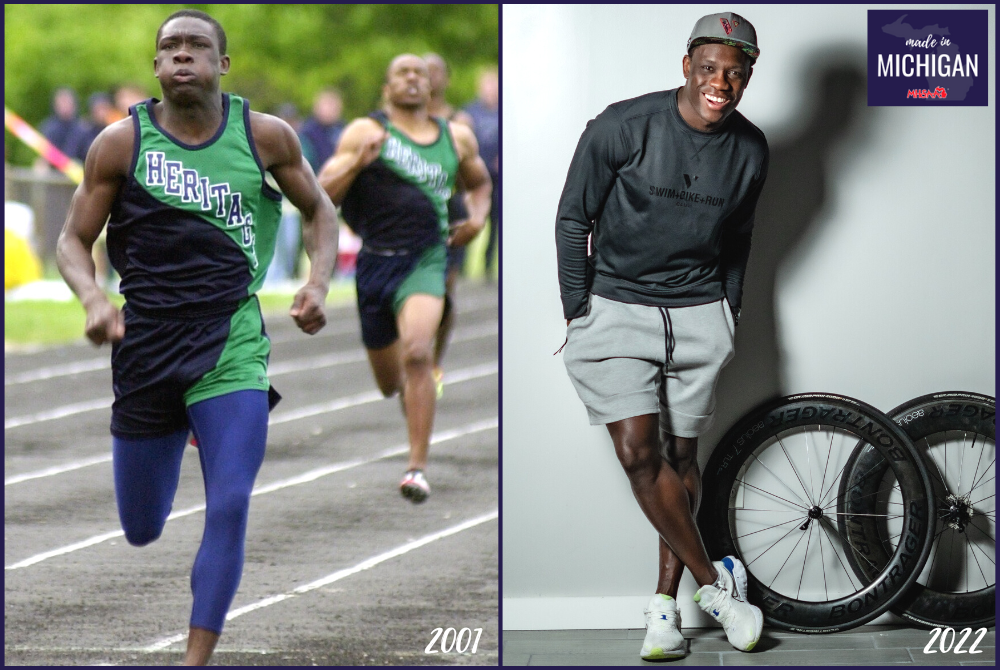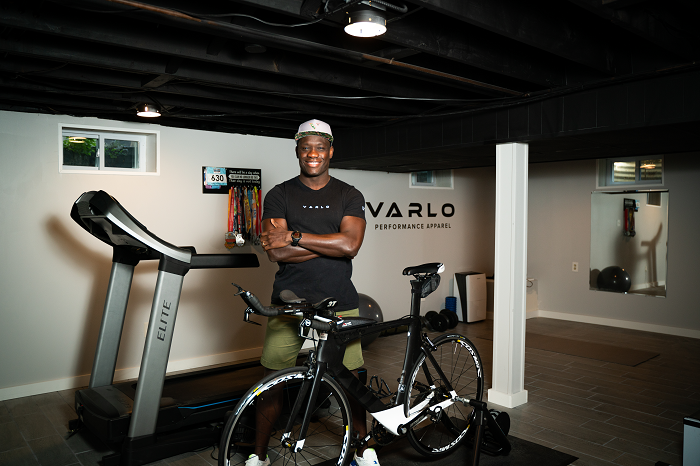
Record Falls, Goals Attained at LPD1 Final
By
Tom Markowski
Special for Second Half
May 30, 2015
ROCKFORD – Jaron Flournoy had his mind set on winning an MHSAA Finals this season.
In order to do so, the sprinter from Westland John Glenn knew he had to do two things: train harder and make a change.
Flournoy finished third in the 200-meter dash last season and failed to make the final in the 100. But he started Saturday’s Lower Peninsula Division 1 Track and Field Final with a burst as he won the 100 with a time of 10:56. In the 200, his best event, Flournoy won with a time of 21.25.
Flournoy had to fend off a charge from friend Skyler Bowden of Saline to win the 200.
“I worked hard this year to get here,” Flournoy said. “I expected (to win the 100). A lot of guys I train with ran with me today. I knew what to expect.
“It’s just a friendship,” Bowden added. “He was going to win the 100. I won the 400. It came down to this.”
Last summer, Flournoy worked with Stanley Edwards, a former track and football star at Detroit Kettering and the University Michigan, and then with Ann Arbor Huron boys track and field coach Rad Greaves.
“The workouts had more intensity (with Greaves),” Flournoy said. “I got stronger. I’m more flexible. Speed-wise, coming out of the blocks, I’m faster.”
Flournoy also quit competing in the 400 to concentrate on the other two sprints. The changes and the hard work paid off. Flournoy, who also played football at John Glenn, signed with Louisiana State University for track.
Bowden had the last laugh, however. Saline won the MHSAA team title, its second and first since 2006, with 71 points. East Kentwood, champions in five of the previous six seasons, was second with 52½ points. Monroe was third with 36, Ypsilanti Lincoln fourth with 27 and Grand Blanc took fifth with 26 points.
“It’s been about team total all year,” Saline coach Al Leslie said. “Skyler Bowden worked hard to get here. He was a baseball player as a freshman.
"I have so much respect for the East Kentwood program. We try to pull all of our best athletes from the other programs to compete. We had 200 kids in the program last year and we have 165 this year. I’m the defensive line coach, and we got three football players to come out for the first time.”
Saline reached the MHSAA Finals (Division 1) in football for the first time this past season.
 For Grant Fisher, his final day competing for Grand Blanc will be something for the record books.
For Grant Fisher, his final day competing for Grand Blanc will be something for the record books.
Fisher won the 1,600 run with an all-Finals record time of 4:00.28, which also will place him second all-time nationally. For much of the race Fisher seemed to be running by himself, and indeed the last half he was five to six seconds ahead of his nearest competitors. Logan Wetzel (4:08.04) of Saline finished second with a time of 4:08.04, leaving Fisher to finish the race all by himself.
The 3,200 run held more drama. Senior Ryan Robinson of Waterford Mott set the pace and Fisher stalked, conserving energy by drafting. With 220 meters remaining, Fisher made his move and passed Robinson. Fisher raced down the final straightaway as if he was finishing a 200 dash, winning easily with a time of 8:53.41. Robinson was second with a time of 9:00.65.
“I felt really good,” Fisher said of his fabulous kick. “It was tough on Ryan. (Running) into the wind it, helped me tremendously to follow him. He’s a great runner.
“The plan was to kick whenever necessary. I just had to gauge it.”
Last week, Robinson won the Oakland County meet with a time of 8:56.6.
Fisher’s time in the 1,600 crushed the previous all-Finals record held by fellow Grand Blanc graduate Omar Kaddurah. Kaddurah ran 4:07.67 in 2010.
“I never raced against Omar,” Fisher said. “I thought it was incredible he ran a 4:10. It’s nice to keep it in Grand Blanc. He was someone I looked up to.”
Next up for Fisher, who signed with Stanford University, is a mile run in New York City in two weeks. It’s a race he’s competed in before, and he said it should be fun because “there’s a rabbit” in the field.
Robie Webster of Ypsilanti Lincoln won both hurdles events, the 110 with a time of 14 seconds and the 300 with a time of 38.03. Webster missed qualifying for the 110 final as a junior, then increased his offseason training to reach his goals.
“I actually hit a few hurdles (in the 110) today,” he said.
Webster signed with Boston University and is looking forward to even greater challenges.
“My mom and I talked about colleges,” he said. “And she wanted me to look at schools with high education and athletics. My first option was BU. I went there on two visits and knew it was the place for me.”
Two more all-Finals records were broken, but by those who already held them. Grand Rapids Kenowa Hills' Donavan Brazier lowered his 800 record time to 1:48.98. Saline's 3,200 relay, made up this season of Logan Wetzel, Josiah Humphrey, Austin Welch and Kevin Hall, lowered its all-Finals record to 7:38.97.
Both records previously were set last season; Wetzel was the only Saline 3,200 relay runner who also was part of that record performance in 2014.
PHOTOS: (Top) Jaron Flournoy (middle) stays ahead of the field during a championship-winning sprint Saturday. (Middle) Grant Fisher set an MHSAA all-Finals record in the 1,600. (Click to see more from RunMichigan.com. Photos by John Brabbs.)

Lessons Learned on Track Have Jibowu's Business Surging to Quick Success
By
Paul Costanzo
Special for MHSAA.com
August 1, 2022
Athletics showed Soj Jibowu just how far he could push himself.
All the time spent on the track, working to become the state’s best high school 400-meter runner, and then more than that, taught him to stretch beyond what he thought were his limits.
So, when it came time to make a decision on whether to jump fully into his apparel company, Varlo, or keep it as a part-time side venture, the 2001 Saginaw Heritage graduate knew he could take himself to another level if needed.
Jibowu is the founder and CEO of Varlo, a clothing company that specializes in outfitting triathletes, but also offers casual wear for men and women. The company is just over three years old, but its clientele includes hundreds of triathletes, eight professionals, three NCAA programs and even hospitals. Merchandise is sold in eight countries.
All of that is validation for Jibowu, who took the leap to pursuing the company full-time just one year into its existence.
“When I resigned (from a medical sales job) to do this full-time, my wife was pregnant with our second child, my daughter wasn’t even walking yet,” said Jibowu, who now lives in Cherry Hill, N.J., with his wife and two young children. “Where was my state of mind to leave my very comfortable, high-paying job to pursue this – to sell clothes?”
His mind was in the same place that helped him reach tremendous heights as a runner, both at Heritage and Central Michigan University.
Jibowu, who was born in Nigeria and spent much of his childhood in Huntsville, Ala., was part of some incredible Heritage teams. He graduated a year behind eventual NFL safety Stuart Schweigert, who he ran with on the Finals-winning 1,600 relay in 2000. Another member of that relay was Derold Sligh, who won the 400-meter Finals title that year, setting the Lower Peninsula Division 1 Finals record in the process. The Hawks were LP Division 1 runners-up as a team that season.
“I ran track when I was younger, and I was terrible,” Jibowu said. “In high school, if I look back at it, I probably would have called it impostor syndrome. I think that was me up until maybe like somewhere in my senior year when I started to think, ‘I’m pretty fast.’ … I had so many dominant people around me, in my mind, I was still the slow guy.”
 As a senior, Jibowu erased that self-doubt. He led Heritage to its first, and still only, Division 1 Finals title, running the 400 in 48.28 and breaking the record Sligh had set the year prior.
As a senior, Jibowu erased that self-doubt. He led Heritage to its first, and still only, Division 1 Finals title, running the 400 in 48.28 and breaking the record Sligh had set the year prior.
It was working to get to that point that Jibowu still credits with his ability to push himself in all things.
“I preach this all the time: if you have the ability to be involved in sports at a young age, do it,” Jibowu said. “It’s a gift, first of all. You don’t know any better when you’re young, you think you’re just training your body, but what’s really, truly occurring is you’re training your mind and building discipline. You’re building your character as far as who you are as a person. What is your will? How far are you willing to push? Am I able to be coached? Am I able to learn? Am I able to lose over and over again and keep going? Am I able to navigate to feel what it’s like to win? What you’re truly developing is how to manage and handle life.”
Jibowu said he didn’t finalize his college decision until late in the process, as he had to work on his test scores into the summer. While at CMU, he majored in biomedical science and chemistry, and he excelled, admitting he was a much better student in college than in high school.
He was also reunited with Sligh on the Chippewas track team, and had a successful career. He was regularly within the top five in the 200 and 400 in the Mid-American Conference, and won a MAC title in the 400 at the 2004 indoor championships. His personal bests in the races were 21.19 and 46.81, respectively.
After graduating from CMU, Jibowu began working as a pharmaceutical rep, then moved into medical sales.
While he remained active, it wasn’t until he took a trip to Chicago that he discovered triathlons.
“I remember seeing these really cool bikes and these really fit people, and then they jumped into Lake Michigan,” he said. “And I didn’t know that was possible, because I didn’t grow up swimming. I didn’t know that volume of people knew how to swim like that. Then they get out of Lake Michigan, jump on their bikes and they’re flying. Then they’re sprinting a 6K and I remember thinking, ‘Oh my God, these guys are the real freaking deal.’ I was hooked and wanted to start competing.”
As he began competing, the wheels for his current venture began turning. At this point, Jibowu was living out east and had worked for a pair of successful start-ups in the medical industry. That helped give him knowledge, and confidence, to make his own moves.
“I had always been into clothes and fashion, and how you express yourself with what you wear,” Jibowu said. “There was an opportunity there. The sport of triathlon is as old as me; it started in (1983). That’s a baby. That’s like basketball without the 3-point line. There’s so much opportunity for innovation.”
With that, Varlo was born, and it has since thrived, with Jibowu and the lessons he learned on a track in Saginaw paving the way.
“If you are in high school and have the ability to be in a sport, it’s a gift,” he said. “At that young of an age, truly learning to manage the trials and tribulations of life. That is a gift.”
2021-22 Made in Michigan
July 28: Running Set Life's Stage for Grosse Pointe South's Record-Setting Meier Sisters - Read
July 25: 2005 Miss Basketball DeHaan Cherishing Newest Title: 1st-Time Mom - Read
July 21: Championship Memories Still Resonate with St. Thomas Star Lillard - Read
July 14: Portage Central Champ Rolls to Vanderbilt, Writing Next Chapter in Alabama - Read
July 12: Coaching Couple Passing On Knowledge, Providing Opportunities for Frankfort Wrestlers - Read
June 30: Hrynewich's Star Continuing to Rise with Olympic, Pro Sports Arrivals - Read
PHOTOS (Top) At left, Heritage’s Soj Jibowu wins the 400 meters during the 2001 Saginaw Valley League championship meet. At right, Jibowu is the founder and CEO of the Varlo clothing company. (Middle) Jibowu’s company specializes in outfitting triathletes, and he has taken up the sport after a successful college track & field career. (Heritage photo courtesy of Saginaw News/MLive; current photos courtesy of Soj Jibowu.)

